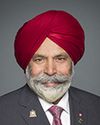I thought about this, as I say, about six months ago, and I remembered the bill because.... I started reading about the problems with Alzheimer's and indeed other dementias while I experienced this in my own family. When I looked at it, I thought the bill we had before Parliament would have required a royal recommendation. That was what we heard at the time. That means it wouldn't have gone forward.
The other problem with it was in regard to the timelines. If you'll notice, in mine I made it that the minister will convene a meeting within a 180 days, within six months, basically. I thought that was more realistic than a statute requiring the minister to move on this thing in several weeks. I didn't think that was realistic. Plus the feedback that I received at the time was that a royal recommendation would be needed; therefore, it wasn't going to proceed.
That being said, when I thought about it, I thought okay, if we can modify it, modify those challenges, then I believe the bill should be able go forward. My colleague Mr. Oliphant will confirm this. At the time I spoke with him about this, he analyzed the bill just on those counts alone. As it comes before you today, I don't think you've heard anybody say or had any advice that it will need a royal recommendation, because we tried to be very careful. I believe the timelines are very realistic.
At the same time, the overall concept of getting into this area, on every occasion, I have mentioned Mr. Gravelle. When I have spoken to people privately, who, as you can probably imagine, have engaged me on this, I have pointed out that this is not the first time Parliament has had a look at this. I hope that it goes forward.
Again, I asked a colleague from another political party to second this bill here. I do want it to be accepted by everyone.
Those are my comments.







